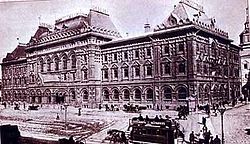- Duma
-
For other uses, see Duma (disambiguation).
A Duma (Russian: Ду́ма, Russian pronunciation: [ˈdumə]) is any of various representative assemblies in modern Russia and Russian history. The State Duma in the Russian Empire and Russian Federation corresponds to the lower house of the parliament. Simply it is a form of Russian governmental institution, that was formed during the reign of the last Tsar, Nicholas II. It is also the term for a council to early Russian rulers ('Boyar Duma'), as well as for city councils in Imperial Russia ('Municipal dumas'), and city and regional legislative bodies in the Russian Federation.
Contents
In early Russian history
The term comes from the Russian word думать (dumat’), "to think" or "to consider". The Boyar Duma was an advisory council to the grand princes and tsars of Russia. The Duma was discontinued by Peter the Great, who transferred its functions to the Governing Senate in 1721.
Municipal dumas
Since 1870 the municipalities in European Russia have had institutions like those of the zemstvos. All owners of houses, tax-paying merchants and workmen are enrolled on lists in a descending order according to their assessed wealth. The total valuation is then divided into three equal parts, representing three groups of electors very unequal in number, each of which elects an equal number of delegates to the municipal duma. The executive is in the hands of an elective mayor and an uprava, which consists of several members elected by the duma. Under Alexander III, however, by laws promulgated in 1892 and 1894, the municipal dumas were subordinated to the governors in the same way as the zemstvos. In 1894 municipal institutions, with still more restricted powers, were granted to several towns in Siberia, and in 1895 to some in Caucasia.
State Duma in Imperial Russia
Main article: State Duma of the Russian EmpireUnder the pressure of the Russian Revolution of 1905, on August 6, 1905, Sergei Witte issued a manifesto about the convocation of the Duma, initially thought to be an advisory organ. In the subsequent October Manifesto, Nicholas II pledged to introduce basic civil liberties, provide for broad participation in the State Duma, and endow the Duma with legislative and oversight powers.
However, Nicholas II was determined to retain his autocratic power. Just before the creation of the Duma in May 1906, the Tsar issued the Fundamental Laws. It stated in part that Tsar's ministers could not be appointed by, and were not responsible to, the Duma, thus denying responsible government at the executive level. Furthermore, the Tsar had the power to dismiss the Duma and announce new elections whenever he wished.
The imperial State Duma was elected 4 times: in 1906, twice in 1907, and in 1912.
State Duma in the Russian Federation
Main article: State DumaThe State Duma (Russian: Государственная дума, Gosudarstvennaya Duma, common abbreviation: Госдума, Gosduma) in Russia is the lower house of the Federal Assembly of Russia (parliament), the upper house being the Federation Council of Russia. Under Russia's 1993 constitution, there are 450 deputies of the State Duma (Article 95), each elected to a term of four years (Article 96); this was changed to a five-year term in late 2008. In previous elections of 1993, 1995, 1999 and 2003 one half of the deputies were elected by a system of proportional representation and one half were elected by plurality in single member districts. However, the 2007 Duma elections were carried out in a new format: all 450 deputies were elected by a system of proportional representation. Russian citizens at least 21 years old are eligible to run for the Duma (Article 97 .
See also
- Elections in Russia
- Tauride Palace
- Moscow City Duma
- Saint Petersburg City Duma
- Zemsky Sobor
- Veche
References
 This article incorporates text from a publication now in the public domain: Chisholm, Hugh, ed (1911). Encyclopædia Britannica (11th ed.). Cambridge University Press.
This article incorporates text from a publication now in the public domain: Chisholm, Hugh, ed (1911). Encyclopædia Britannica (11th ed.). Cambridge University Press.
Categories:- Historical legislatures
- Government of Russia
- Russian loanwords
- Government of the Russian Empire
Wikimedia Foundation. 2010.

